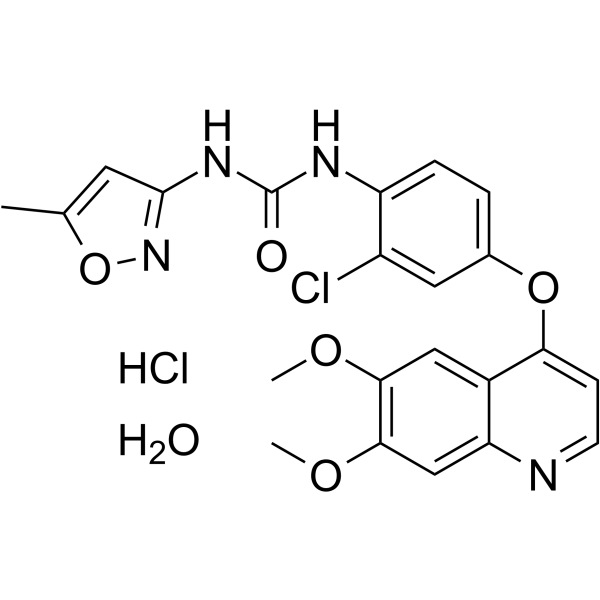Tivozanib
Modify Date: 2025-08-25 20:38:31

Tivozanib structure
|
Common Name | Tivozanib | ||
|---|---|---|---|---|
| CAS Number | 682745-41-1 | Molecular Weight | 509.33900 | |
| Density | N/A | Boiling Point | N/A | |
| Molecular Formula | C22H22Cl2N4O6 | Melting Point | N/A | |
| MSDS | N/A | Flash Point | N/A | |
| Name | 1-[2-chloro-4-(6,7-dimethoxyquinolin-4-yl)oxyphenyl]-3-(5-methyl-1,2-oxazol-3-yl)urea,hydrate,hydrochloride |
|---|---|
| Synonym | More Synonyms |
| Description | Tivozanib hydrochloride hydrate is a potent and selective and orally active VEGFR tyrosine kinase inhibitor with IC50是of 0.21, 0.16, 0.24 nM for VEGFR-1, VEGFR-2, VEGFR-3, respectively. Tivozanib hydrochloride hydrate inhibits angiogenesis and vascular permeability in tumor tissues and shows antitumor activity. Tivozanib hydrochloride hydrate has the potential for the research of metastatic renal cell carcinoma (RCC) [1][2][3]. |
|---|---|
| Related Catalog | |
| Target |
VEGFR-1:0.21 nM (IC50) VEGFR-2:0.16 nM (IC50) VEGFR-3:0.24 nM (IC50) |
| In Vitro | Tivozanib hydrochloride hydrate inhibits the phosphorylation of VEGFR-1, VEGFR-2 and VEGFR-3[2]. |
| In Vivo | Tivozanib hydrochloride hydrate (1 mg/kg; p.o.; 14 days) suppresses the development of CNV lesions and leds to a significant regression of established CNV, reducing the affected areas by 67.7%[4]. |
| References |
| Molecular Formula | C22H22Cl2N4O6 |
|---|---|
| Molecular Weight | 509.33900 |
| Exact Mass | 508.09200 |
| PSA | 123.69000 |
| LogP | 5.81130 |
| InChIKey | RQXMKRRBJITKRN-UHFFFAOYSA-N |
| SMILES | COc1cc2nccc(Oc3ccc(NC(=O)Nc4cc(C)on4)c(Cl)c3)c2cc1OC.Cl.O |
| Storage condition | -20°C |
| Tivozanib hydrochloride monohydrate |
| UNII-8A9H4VK35Z |
| Tivozanib hydrochloride hydrate |
| Tivozanib HCl hydrate |
| Kil-8951 |
| Tivozanib HCl |